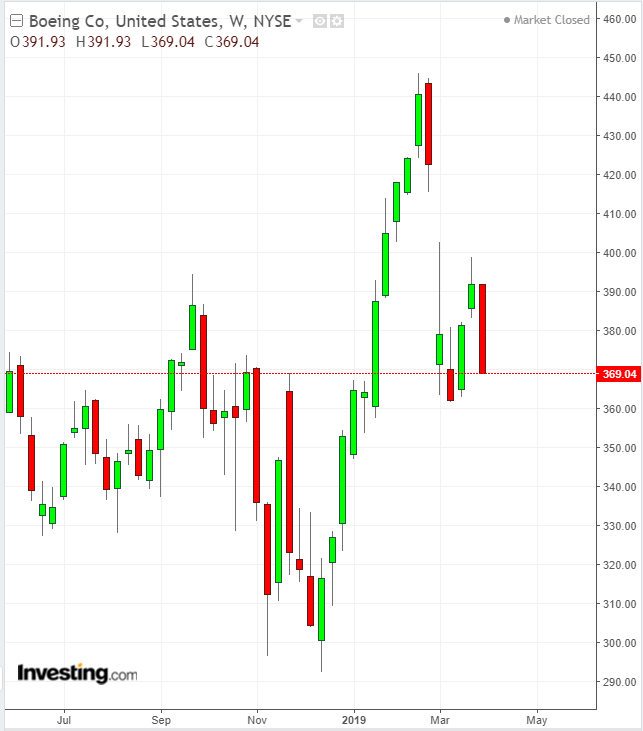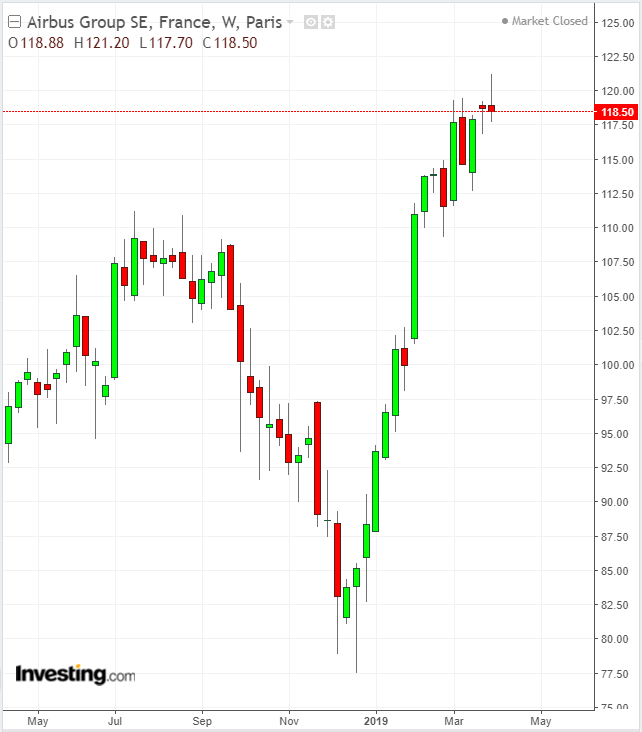While Airbus (PA:AIR), (OTC:EADSY) and Boeing (NYSE:BA) shares posted neck-and-neck gains in the first two months of the year, the recent divergence in their stock price performance may indicate that the European aircraft maker is developing a competitive edge.

Though Airbus’s management said it doesn’t seek to take advantage of the grounding of its American arch rival’s top-selling 737 MAX aircraft following two crashes involving the model, five months apart, in which all on board died, it may mark a shift in the business outlook in favor of the European company. Much will depend on the speed at which Boeing resolves the crisis.

The upward trajectory of Airbus shares has been uninterrupted in 2019. They touched a record high on April 9, with overall gains of more than 40% so far this year. A 12% drop in Boeing’s shares since a 737 MAX aircraft operated by Ethiopian Airlines crashed on March 10 in Addis Ababa, trimmed the U.S. aviation company's stock's year-to-date gain to 14%.
Airbus instructed its sales staff on a conference call that they shouldn’t mention the Boeing crashes in pitches to customers, Bloomberg reported March 30, citing an unidentified person who participated. “When something like that happens, we’re all one big family,” Airbus’s outgoing CEO Tom Enders, said at an industry event on March 15, according to Bloomberg. “Safety is not a competition item.”
To be sure, industry analysts noted that with a full order book and a wait-list due to capacity constraints, Airbus couldn’t easily step in to fill orders from Boeing customers that want to switch. As of the end of February, Airbus had a backlog of more than 5,800 firm orders for its A320neo family of jets, the Boeing 737 MAX's natural competitor, The Motley Fool said. At an increased production rate of 725 per year planned for 2021, it would take eight years to fulfill all the existing orders, according to the report.
A mega order for 300 aircraft from China, worth an estimated 30 billion euros ($33.8B), signed during Chinese President Xi Jinping’s visit in Paris last month was another factor lifting the Airbus share price. The deal is for 290 A320 aircraft and 10 A350 XWB planes.
It strengthens the European manufacturer’s foothold in the world’s second largest civil aviation market. According to Airbus’s own estimates, China will need some 7,400 new passenger and freighters aircraft in the next 20 years, about 19% of the global demand.
On February 14, Airbus posted adjusted fourth-quarter operating profit of 3.1 billion euros, 56% higher than a year earlier, and topping a consensus estimate of 2.36 billion euros compiled by the company. Revenue rose 11% to 23.29 billion euros, beating the 22.82 billion-euro average analyst forecast.
The Franco-German plane maker also said in February it will stop building its A380 double-decker jumbo jet in 2021 after the model’s most important customer, Emirates, scaled back its orders and “given the lack of order backlog with other airlines.” Airlines are now favoring, narrow bodied, fuel-efficient models, it said.
Airbus predicted that it will deliver 880-890 commercial aircraft this year, compared with 800 in 2018. It also forecast a 15% increase in operating profit in 2019.
“We expect the group to report strong growth in earnings and cash flow in the medium term and we are of the view that this positive outlook is not reflected in its current price,” Kristian Camenzuli, Investment Manager at Calamatta Cuschieri, a Maltese brokerage, wrote in the Times of Malta earlier this month.
“The fact that Boeing has been under pressure recently due to issues with the 737 Max and the large order made by the Chinese government to purchase 300 jets is an additional bonus.”
The brokerage has recently initiated coverage of the Airbus stock with a ‘Buy’ recommendation, predicting that the share price may rise to 138 euros in a year, which would mean a 17% gain from the current level.
Still, there may be some fundamental headwinds on the horizon. Earlier this week, U.S. President Donald Trump threatened to levy $11B in tariffs on European goods, including wines, cheeses, seafood and more significantly for Airbus, aircraft parts.
A tweet from the U.S. president, sent out yesterday, makes it clear that at least a portion of the driving force behind this latest development has much to do with the Airbus vs. Boeing rivalry:
According to Trump's tweet:
"The World Trade Organization finds that the European Union subsidies to Airbus has adversely impacted the United States, which will now put Tariffs on $11 Billion of EU products! The EU has taken advantage of the U.S. on trade for many years. It will soon stop!"
The subsidies aren't something new. Both the U.S. and Europe have been providing these payments to their respective aviation behemoths as part of an effort to keep them viable. According to Vox, "the dispute has turned into a huge fight, in which both sides claim they've been harmed purposefully."
Expectations are that the EU will retaliate in kind with tariffs toward U.S. goods. Marie Kasperek, a transatlantic business expert at Washington D.C. think tank the Atlantic Council, quoted in Vox, said, "It's kids in the sandbox hitting each other with shovels."
